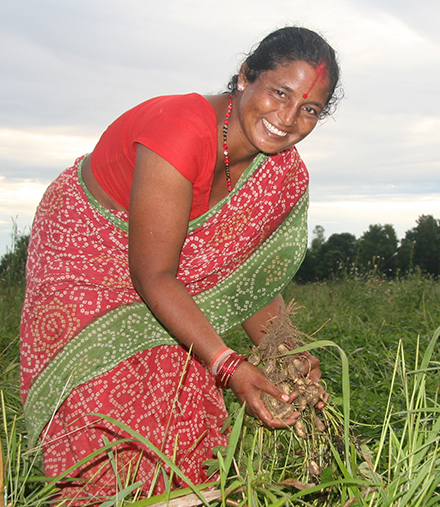Lila Devi married Ram Bahadur Sunar when she was 14 years old. Shortly after, the couple traveled to India in search of a better future. There, they worked as laborers on construction sites, leaving their young child to play alone at home–a modest shanty shed. They were in India for five years, but the young couple longed for a place where they felt they belonged, a place that felt like home.
Eventually, they packed their bags and returned to Nepal. With savings earned from a half-decade of hard labor in India, they bought .08 acre of land. They had no money to build a house, so they lived in someone’s cow shed. The first year was tough, and it became necessary for Ram to work in India for a few months as a seasonal laborer to try to support his growing family.
In 2008, while her husband worked in India, Lila joined Heifer Nepal’s Farmer Savings Women’s Group–a self-help group (SHG) that brought many benefits to her family. As a new member of the SHG, Lila participated in numerous trainings, including Cornerstones, Kitchen Gardening, SHG Management, Fodder and Forage Management, Gender Justice, Reproductive Health and HIV Awareness. She also received two goats, $56 from the group’s revolving vegetable fund, $161 from the group’s land lease fund, and $241 from the group’s irrigation fund. Today she is serves her group as chairperson.

Since joining the group, Lila has taken out an $837 loan from the group fund at an annual rate of 24 percent to purchase vegetable and peanut seeds and to rent a tractor. She remembers when they had to borrow from local lenders at a 7 percent monthly interest rate to purchase seeds. With easy access to credit at affordable rates, life is less stressful for Lila and Ram.
The couple leases 3 bigha, or 5 acres, of land where they cultivate tomatoes, chili peppers, cabbage, cauliflower, peanuts, fodder and forage, rice and wheat. Ram delivers the farm’s produce to the local market in his cycle cart. If his haul is really large, he hires a mini truck. In seven months they can earn a gross income of approximately $1,788 from vegetables, $1,546 from peanuts, $4,591 from fodder/forage, and $1,449 from wheat.
In a few months, Lila’s SHG will be incorporated into a Social Women’s Cooperative. The cooperative will provide famers like Lila and Ram an easy way to market their products. Working collectively saves farmers valuable time and allows them to earn better rates. Ram is especially excited about the cooperative because he thinks it will save him the hassle of bargaining with middlemen.
In addition to farming activities, the family raises chickens, ducks, three goats and a cow. About four years ago they bought a calf for $24. Now it provides enough milk for the family and a surplus, from which Lila makes curd to sell. She can earn $19 a month from curd alone.
You can help families like Ram and Lila stay together and prosper by making a year-end, tax-deductible gift today.
With their savings, the couple purchased 36 kattha, or 3 acres, of farmland. Since cauliflower nets a good price at market, Lila plans to expand their half-acre cauliflower production to 1.25 acres.
Just seven years ago Ram earned $483 in eight months as a seasonal laborer in India. Now, he and Lila work together and can earn $5,243 in only seven months by selling what they grow on their farm. If Lila hadn’t joined the Farmer Savings Women’s Group, Ram is certain he would still be far away from his family working for meager wages in India.
Today, the couple lives in a small, but lovely house, with their two daughters, ages 20 and 18, and 16-year-old son. When not in school, the children help out on the family farm. Their neighbors respect them and consider them model farmers. Ram and Lila have found their home–a place where they belong.
Story and photos courtesy of Heifer Nepal.
